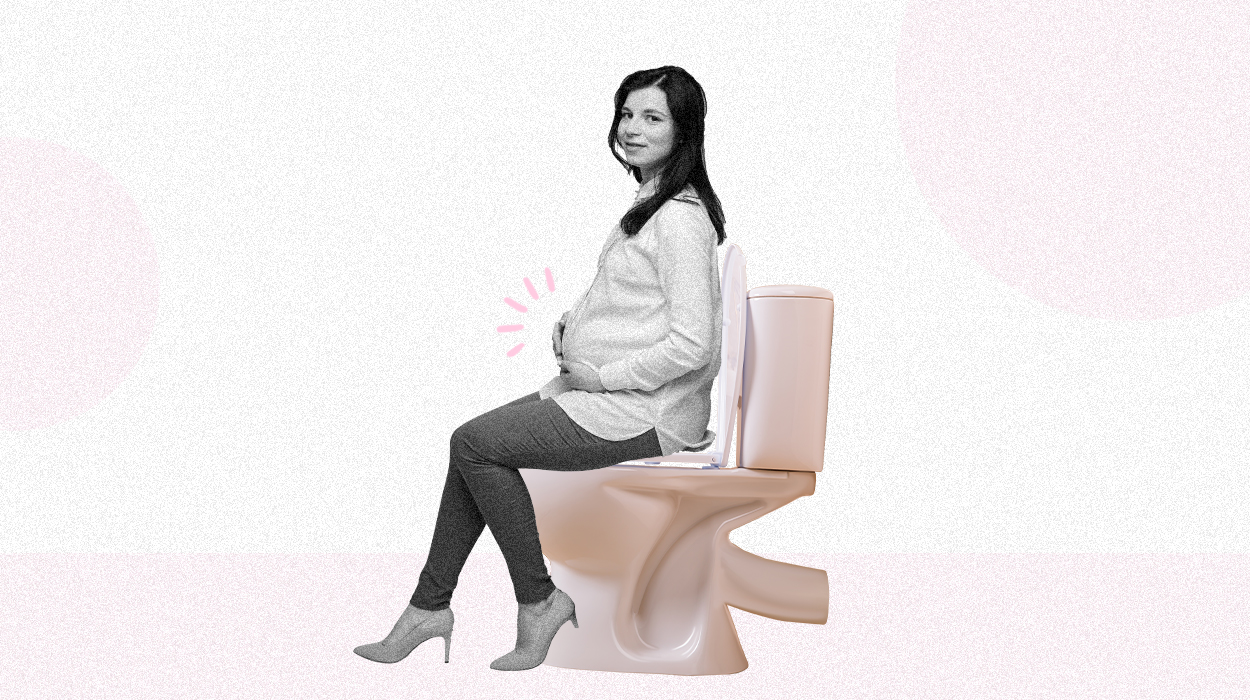 Evidence Based
Evidence Based
Evidence Based
This article is objectively based on relevant scientific literature, written by experienced medical writers, and fact-checked by a team of degreed medical experts.
Our team of registered dietitian nutritionists and licensed medical professionals seek to remain objective and unbiased while preserving the integrity of any scientific debate.
The articles contain evidence-based references from approved scientific sites. The numbers* in parentheses (*1,2,3) will take you to clickable links to our reputable sources.
How Soon After Loose Bowels Did You Go Into Labor In 2024?

The countdown to childbirth evokes anticipation and curiosity as your due date draws near. Expectant parents often wonder about the signs and signals that indicate the imminent arrival of their little one. The question arises from the stories shared: How soon after loose bowels did you go into labor?
While individual experiences may vary, some women report experiencing loose bowels as an early sign of labor. This phenomenon can be attributed to hormonal changes,[1] fluid shifts, and the body’s preparation for childbirth.
Here we delve into loose bowels and the onset of labor. We’ll shed light on this intriguing aspect of the journey toward parenthood. Additionally, we’ll explore how vitamins and other factors may impact labor. Nutrients affecting health will also favorably impact health during pregnancy and labor.
How Long After Diarrhea Does Labor Start?
The onset of labor following a loose bowel can vary or even be irrelevant. While some individuals may experience labor soon after, it is not a definitive timeline.
Signs like rhythmic contractions, lower back pain, water breaking, or a bloody show are more reliable indicators of when labor begins.
It is essential to consult with your healthcare provider better to understand your unique situation and the progression of labor.
How Soon After Loose Bowels Did You Go Into Labor?
The timing of labor can vary after experiencing loose stool or diarrhea during pregnancy. While it is not a definitive indication that delivery is imminent, some have reported that it could indicate that labor is 24 to 48 hours away.
How soon after diarrhea does labor start? Notably, loose stool or diarrhea can be caused by various factors unrelated to labor, such as dietary changes, hormonal fluctuations, or gastrointestinal issues.[2] Therefore, it should not be relied upon as a sole predictor of labor. Monitoring other signs such as contractions,[3] water breaking or a bloody show is more reliable in determining the onset of labor.
Lower back pain or the urge to have a bowel movement could indicate baby descent, dilation, or thinning of your cervix. Thinning of your cervix could result in losing your mucus plug,[4] but only a vaginal exam can determine dilation or thinning. If you are concerned about changes in bowel movements or have any questions, consult your healthcare provider. They can offer a proper evaluation and medical guidance throughout your pregnancy journey.
Featured Partner

Low-Calorie
Non-GMO
Vegan-friendly
Get Blown Away By Expert-Crafted Formula
Learn More About Colon Broom – one of the quality supplements promoting regular bowel movements, alleviates bloating, and supports healthy cholesterol levels.
Is Loose Bowels A Sign Of Labor?
If you experience diarrhea, it is not necessarily a symptom of when labor starts, nor does it trigger labor. While not a universal occurrence, it is believed to be associated with hormonal changes[5] and the body’s natural response to the impending childbirth process. Changes in your level or function of progesterone, especially, may provoke[6] irritability of your uterine muscle fibers and bowel motility.
Prostaglandins can trigger diarrhea,[7] hormones that soften and dilate the cervix. Also, hormonal shifts can affect the digestive system, leading to loose stools.
It is essential to note that loose bowel movements alone are not a clear sign of labor. They should be viewed with other signs, such as regular labor contractions, rupture of membranes or loss of amniotic fluid, an increase in vaginal discharge, or a bloody show. These are more reliable indicators of imminent labor.
While uncomfortable, loose bowel movements before labor are generally considered a normal part of the process. Staying hydrated and consuming a well-balanced, healthy diet with fiber-rich foods can help regulate bowel movements. Some individuals find relief by incorporating probiotics into their diet, which may aid in maintaining healthy gut flora and promoting regular bowel movements.
If you have concerns about the signs of labor, consult with your healthcare provider. They can provide personalized guidance and support as you navigate the exciting journey toward childbirth.
Causes Of Pre-Labor Diarrhea
Experiencing diarrhea before labor is a phenomenon some expectant parents encounter as they approach childbirth. Several factors can contribute to this, from hormonal changes to dietary considerations. Understanding the causes behind pre-labor diarrhea can help expectant parents gain insight into this aspect of childbirth.
The common causes of diarrhea before labor include:
Hormonal Shifts
The body undergoes hormonal changes as labor approaches, particularly increased prostaglandin production. Prostaglandins help prepare the cervix for labor but can also stimulate intestinal contractions, leading to loose stools. Also, it has been suggested that the actions of progesterone are counteracted at this time, enhancing bowel motility.
Gastrointestinal Adjustments
The body readies itself for labor by diverting blood flow to the uterus and pelvis. This increased blood circulation can affect the digestive system, causing changes in bowel movements.
Nutrient Absorption
Prenatal supplements, such as those containing iron or magnesium, are often recommended during pregnancy to meet increased nutrient requirements. However, these supplements can have a laxative effect, contributing to loose stools.
Dietary Factors
Dietary changes, such as consuming high-fiber foods or experiencing food intolerances, can trigger diarrhea. Additionally, certain foods or drinks, such as spicy or greasy foods, may irritate the digestive system and result in loose bowel movements. Fluid shifts associated with hormonal fluctuations can alter the density of the stool.
Increased Peristalsis
The same biochemistry that initiates uterine contractions in the early stages of labor can stimulate the intestines, speeding up stool movement through the digestive system.
Monitoring other signs of labor, such as contractions, is crucial for a comprehensive assessment. Consult with your healthcare provider for concerns about diarrhea or other pregnancy-related symptoms.
What To Do If You Have Loose Bowels During Pregnancy
If you experience loose bowels before giving birth, there are a few steps you can take:
- Stay hydrated. Drink plenty of fluids to avoid dehydration.
- Eat light and balanced meals. Stick to easily digestible foods and incorporate fiber-rich options like fruits and vegetables.
- Rest and relax. Take breaks and prioritize rest to conserve energy for the upcoming active labor.
- Communicate with your healthcare provider. Inform them about any changes or concerns regarding your bowel movements.
When To Seek Professional Help
While pre-labor diarrhea is generally considered a normal response to childbirth, there are instances where seeking professional help is advisable:
Severe Or Prolonged Diarrhea
You should consult your healthcare provider if diarrhea becomes severe or persistent. Contact a medical professional immediately if other concerning symptoms like abdominal pain accompany diarrhea.
Signs Of Dehydration
It may indicate dehydration if you experience excessive fluid loss. Intense thirst, dark urine,[8] dizziness, constipation, or reduced urine output should prompt medical attention to prevent complications.
Preterm Labor Concerns
Call your healthcare provider immediately if you are experiencing preterm contractions associated with pre-labor diarrhea, i.e., before 37 weeks gestation. They will assess the situation and determine the best action to ensure your and your baby’s well-being.
Other Worrisome Symptoms
Contact your healthcare provider immediately if you notice alarming symptoms such as intense abdominal pain or significant decreases in the baby’s movements. While spotting can indicate dilation of your cervix when labor begins, constant bleeding is always an emergency.
A sudden gush of fluid when your water breaks can be part of labor. However, the longer the time between this and delivery, the more risk of infection. Loss of fluid is a must-notify event!
Remember, your healthcare provider is the best resource to evaluate your symptoms, medical history, and overall condition to determine if intervention is required. Trust your instincts and seek professional help whenever you have concerns about pre-labor diarrhea or other aspects of your pregnancy.
Other Common Signs Of Labor
Recognizing the signs of labor becomes crucial as your due date approaches. While every labor experience is unique, there are common indicators that labor may be near. Here are some of the other common signs of labor you may experience as your body prepares for childbirth:
- Regular uterine contractions — not Braxton Hicks contractions or irregular contractions.
- Water breaking.
- Bloody show.
- Backache and pelvic pressure.
- Nesting instinct or other psychological signs.[9]
- Energy surge.
- Cervical changes.
- Other digestive changes.
- Disrupted sleep.
The Takeaways
The question of how soon after diarrhea labor starts lacks a definitive answer. While loose bowels can be a potential sign of impending labor, the timing can vary for each individual. It is important to consider other signs and consult with healthcare providers to understand labor progression better.
Frequently Asked Questions
While early labor symptoms typically include regular contractions, water breaking, vaginal discharge, and the loss of a mucus plug,[10] the only sign of actual labor is dilation of the cervix. This is notoriously difficult to know without a vaginal exam.
Loose bowels can be a sign that labor is approaching, but it is not a definitive indication. It is essential to consider other early labor signs and consult with healthcare providers for a clearer understanding.
The duration of diarrhea before labor varies. It can occur in the days leading up to labor or may not occur at all. Each person’s labor experience is unique.
The color of poop before labor is typically normal, similar to your regular bowel movements. Depending on your diet and hydration, it can vary from light to dark brown.
+ 10 sources
Health Canal avoids using tertiary references. We have strict sourcing guidelines and rely on peer-reviewed studies, academic researches from medical associations and institutions. To ensure the accuracy of articles in Health Canal, you can read more about the editorial process here
- Mesiano, S. (2022). Progesterone withdrawal and parturition. [online] 224, pp.106177–106177. doi:https://doi.org/10.1016/j.jsbmb.2022.106177.
- Altomare, A., Claudia Di Rosa, Imperia, E., Emerenziani, S., Cicala, M. and Pier, M. (2021). Diarrhea Predominant-Irritable Bowel Syndrome (IBS-D): Effects of Different Nutritional Patterns on Intestinal Dysbiosis and Symptoms. [online] 13(5), pp.1506–1506. doi:https://doi.org/10.3390/nu13051506.
- Acog.org. (2020). How to Tell When Labor Begins. [online] Available at: https://www.acog.org/womens-health/faqs/how-to-tell-when-labor-begins
- Lacroix, G., Valérie Gouyer, Frédéric Gottrand and Jean-Luc Desseyn (2020). The Cervicovaginal Mucus Barrier. [online] 21(21), pp.8266–8266. doi:https://doi.org/10.3390/ijms21218266.
- Bonapace, E.S. and Fisher, R.S. (1998). CONSTIPATION AND DIARRHEA IN PREGNANCY. [online] 27(1), pp.197–211. doi:https://doi.org/10.1016/s0889-8553(05)70353-8.
- Oksana Shynlova, Nadeem, L., Zhang, J., Dunk, C. and Lye, S.J. (2020). Myometrial activation: Novel concepts underlying labor. [online] 92, pp.28–36. doi:https://doi.org/10.1016/j.placenta.2020.02.005.
- Gao, J., Xiong, T., Gintautas Grabauskas and Owyang, C. (2022). Mucosal Serotonin Reuptake Transporter Expression in Irritable Bowel Syndrome Is Modulated by Gut Microbiota Via Mast Cell–Prostaglandin E2. [online] 162(7), pp.1962-1974.e6. doi:https://doi.org/10.1053/j.gastro.2022.02.016.
- Shaheen, N., Abdulrahman Ali Alqahtani, Hussam Assiri, Reem Alkhodair and Hussein, M. (2018). Public knowledge of dehydration and fluid intake practices: variation by participants’ characteristics. [online] 18(1). doi:https://doi.org/10.1186/s12889-018-6252-5.
- Ibone Olza Fernández, Uvnäs-Moberg, K., Ekström-Bergström, A., Leahy-Warren, P., Sigfridur Inga Karlsdottir, Nieuwenhuijze, M., Villarmea, S., Hadjigeorgiou, E., Kaźmierczak, M., Spyridou, A. and Buckley, S.J. (2020). Birth as a neuro-psycho-social event: An integrative model of maternal experiences and their relation to neurohormonal events during childbirth. [online] 15(7), pp.e0230992–e0230992. doi:https://doi.org/10.1371/journal.pone.0230992.
- Baxolele Mhlekude, Annasara Lenman, Phikolomzi Sidoyi, Joseph, J., Kruppa, J., Charles Bitamazire Businge, Mdaka, M.L., Konietschke, F., Pich, A., Gerold, G., Goffinet, C. and Anwar Suleman Mall (2021). The barrier functions of crude cervical mucus plugs against HIV-1 infection in the context of cell-free and cell-to-cell transmission. [online] 35(13), pp.2105–2117. doi:https://doi.org/10.1097/qad.0000000000003003.



